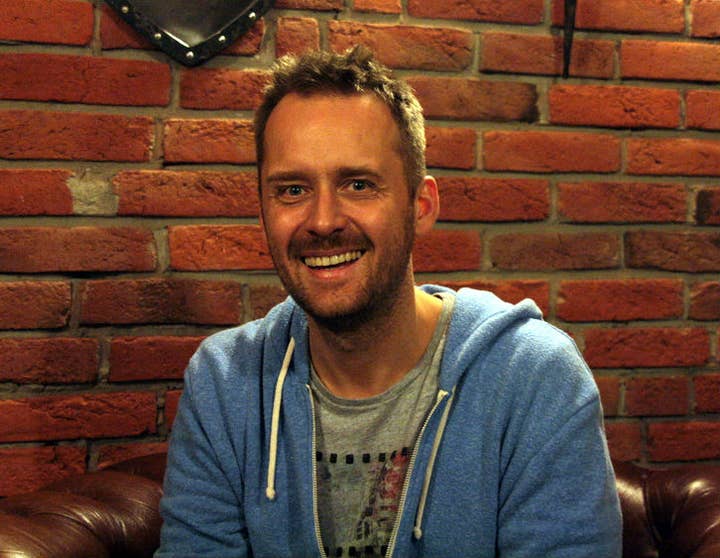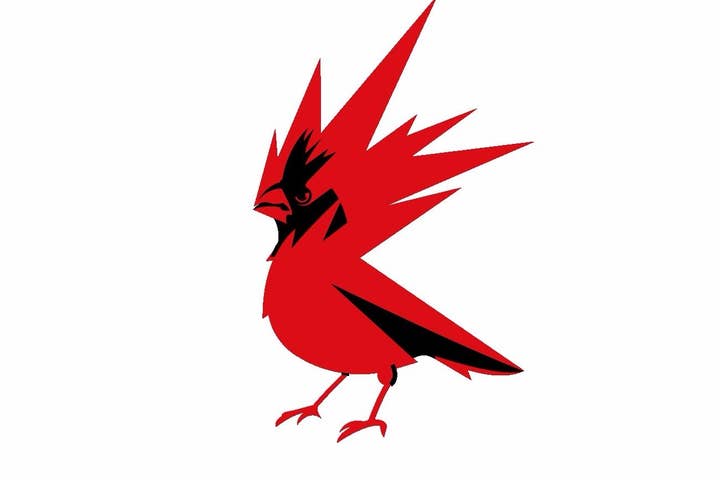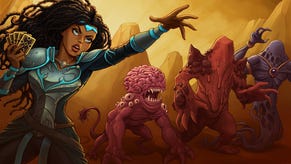"Cross-play with other networks? That's not the Microsoft of ten years ago"
Marcin Iwinski sees a bright future for CD Projekt's GOG Galaxy, even in a world where Steam and UWP exist
If you were among the hordes of people who purchased The Witcher 3 at retail, you might have noticed something else inside the box. Despite the huge amount of work required to produce and release an RPG on that scale, CD Projekt willingly took on a second gargantuan task: launching GOG Galaxy, the most significant evolution of its online storefront to date, at exactly the same time. Millions of people bought a box containing The Witcher 3. Every one of them was invited to sign up.
The gambit worked. After two weeks, with 4 million copies sold, GOG Galaxy had attracted almost 700,000 sign-ups. The Witcher 3 breezed past 6 million sales four weeks later, and one can only assume that number has increased dramatically since then. Marcin Iwinski, CD Projekt's CEO, says that the company's most successful game to date was "very beneficial" for the uptake of GOG Galaxy, allowing it to be as ambitious with the platform as it had been with The Witcher 3.
"Having our own games is great, because we can prove things with them. We had millions of installs with GOG Galaxy," he says. "It sounds simple, but it's not that simple in execution, because then comes D-Day and a couple of hundred-thousand people say, 'I want to play it... now!' And it either works, or it doesn't."
"We fine-tune and hand-polish every different aspect, because that's what makes GOG Galaxy different"
If Iwinski's demeanour is any indication, the launch of GOG Galaxy certainly worked, and the breadth of its features will allow CD Projekt to add games to the platform that were previously off-limits. "Certain functionality for games was impossible to provide, both for publishers and for users," he says. "We weren't able to launch certain games. There's a whole tech dependency, so to speak, and we had to catch up on that. Before, GOG.com was pretty much just a web page. We're pushing that tech threshhold more and more, and we're almost there."
But those new features also bring GOG Galaxy more in line with Steam, a platform so pervasive that it's regarded as virtually interchangeable with the PC market as a whole. In reality, that has never been entirely true, and GOG.com - known as Good Old Games when it launched in 2008 - is the principal reason why. Historically, CD Projekt's marketplace has been known for its unyielding stance against DRM, and though GOG Galaxy is a clear play at a wider audience, Iwinski emphasises the value of holding on to those distinctive values even as the platform grows.
"There are two worlds: people for whom the DRM free aspect is important, and people who probably wouldn't even notice. They just want a seamless, auto-updating experience where they are always online. They care more about what kind of functionality they have. Why is this better? Can they get an immediate refund if a game doesn't work? I think we have to cater to both groups."

For some publishers, CD Projekt's distaste for DRM remains "a dealbreaker" in partnering with the GOG platform. Iwinski has seen that resistance weaken over time - "it used a dealbreaker for everything, and now it's okay for the back catalogue" - but a shortage of content is unlikely to prove a problem. There are now 1500 games available through the platform, both old and new, at a wide range of price points. Indeed, Iwinski believes that a measured approach may be the best path forward, allowing GOG Galaxy to emerge as a more curated alternative to existing digital marketplaces.
"Don't think of us as an app store, where there's everything." he says. "We're pre-selecting games, and if we miss something we listen to the community and they can use our wishlist. Ultimately, we want to have all the best games, both ours and other developers."
Valve's response to the number of submissions it received for Steam was to hand more power to its users through concepts like Greenlight, individual storefronts and Early Access. GOG Galaxy has an equivalent to Early Access in its "Games In Development" section, but CD Projekt's description emphasises, "hand-picking only the games we can truly stand behind," and, "avoiding bloat." Stories about disappointed players on Steam Early Access games are not difficult to find, and neither are complaints about the number of new games that hit Steam every month. The sense that CD Projekt is defining GOG Galaxy in response to those issues is difficult to ignore.
"Let's be honest here and give Steam all the credit," Iwinski says. "Valve came up with Early Access and it was great - and it still is. However, we think that we're coming later to the game, and if we can improve then why shouldn't we? As we plan and execute at the same time, it's easier for us to analyse what could have been improved. When you come up with a totally new concept it's hard to see that this part will work this way, and that part will work that way.
"It's not the battle of who can make a better ghetto any more, but who is better for the gamer. That's what we're after"
"That's also part of GOG Galaxy. We fine-tune and hand-polish every different aspect, because that's what makes us different. That's the difference in our proposition. Let me take a saying, and use a city from The Witcher: 'Novigrad wasn't built in a day.'"
Recently, though, Epic's Tim Sweeney cast doubt on the future for online platforms in general, naming CD Projekt and GOG in a widely circulated article about Microsoft's Universal Windows Platform. Novigrad may not have been built in a day, but the "monopoly" Sweeney described suggests that there may not be too many days left for CD Projekt to execute its strategy. Iwinski confirms that he read the article in question, and while he can understand Sweeney's argument, he believes it's based on a perception of Microsoft rooted in its past - not its present.
"If you look at Microsoft today and Microsoft ten years ago, it's a very different company," he says, pointing to the strategic pivot required with Xbox One as a chastening milestone in that respect. "In the past it was very Microsoft-ish to lock down everything, to make sure they had full control. But Satya Nadella is saying, 'put all of our apps on all systems.' I think people should think about that, because if they did [what Sweeney suggests], in my personal opinion it will really backfire big time.
"So let's cut Microsoft some slack, and see if they will follow up in terms of what they are preaching about openness. In my opinion, it's the only way to go for them, and the announcement about cross-play? Fuckin' yeah. Cross-play with other networks? That's not the Microsoft of ten years ago. No way.
"And Sony is very fast coming back and saying, 'Yes, yes, with us it's okay.' And that's great. It's not the battle of who can make a better ghetto any more, but who is better for the gamer. That's what we're after. It's about opening up and competing on who has the better offer."









